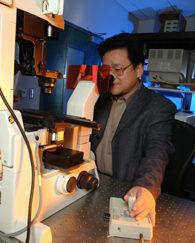
A team of researchers from Emory, Georgia Tech and the Perelman School of Medicine at the University of Pennsylvania have been given a 5-year, $7 million dollar "transformative" grant by the National Institutes of Health. Shuming Nie, PhD, and his colleagues at the Emory-Georgia Tech Nanotechnology Center for Personalized and Predictive Oncology have been developing fluorescent nanoparticle probes that hone in on cancer cells. From a medical perspective, improved visualization of the tumor from surrounding tissues allows for a more successful operation.
The grant includes plans for tests of the nanoparticles and cancer detection instruments on dogs with naturally occurring lung tumors and a first-in-human clinical trial for patients with lung cancer at the University of Pennsylvania. Previous research leading to the current grant was supported by a Grand Opportunities grant from the National Cancer Institute (NCI) and the NIH Director’s Office, and by the NCI Centers of Cancer Nanotechnology Excellence (CCNE) at Emory and Georgia Tech.
“At present, a significant group of patients who undergo surgery leave the operating room without a complete resection due to missed lesions,” Nie says. “Our main goals are to help surgeons distinguish tumor margins, identify diseased lymph nodes and micrometastases, and to determine if the tumor has been completely removed. Having these capabilities can be expected to make a major impact in reducing recurrence rates of lung cancer after surgery.”
